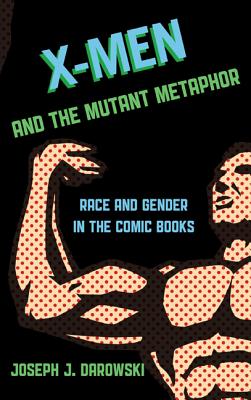First appearing in 1963, The Uncanny X-Men had a rough start, lasting until 1970 when the comic book was canceled due to low sales. Following a relaunch in 1975, however, it found new popularity thanks to intricate scripting by Chris Claremont and the artwork of John Byrne. Within a few years, The Uncanny X-Men was one of Marvel Comics’ best-selling series and over the decades it became one of the most successful and popular franchises in comic book history. Spin-off titles, mini-series, multimedia adaptations, and a massively expanded cast of characters followed. One of the reasons for the success of X-Men is its powerful “mutant metaphor,” which enhances the stories with cultural significance and the exploration of themes such as societal prejudice and discrimination.In X-Men and the Mutant Metaphor: Race and Gender in the Comic Books, Joseph J. Darowski thoroughly analyzes The Uncanny X-Men, providing its historical background and dividing the long-running series into distinct eras. Each chapter examines the creators and general plot lines, followed by a closer analysis of the principal characters and key stories. The final chapter explores the literal use of race and gender rather than the metaphorical or thematic ways such issues have been addressed. This analysis includes insights gained from interviews with several comic book creators, and dozens of illustrations from the comic book series. Of particular significance are statistics that track the race and gender of every X-Men hero, villain, and supporting character. By delving into the historical background of the series and closely examining characters and stories, X-Men and the Mutant Metaphor illuminates an important popular culture phenomenon.
First appearing in 1963, The Uncanny X-Men had a rough start, lasting until 1970 when the comic book was canceled due to low sales. Following a relaunch in 1975, however, it found new popularity thanks to intricate scripting by Chris Claremont and the artwork of John Byrne. Within a few years, The Uncanny X-Men was one of Marvel Comics’ best-selling series and over the decades it became one of the most successful and popular franchises in comic book history. Spin-off titles, mini-series, multimedia adaptations, and a massively expanded cast of characters followed. One of the reasons for the success of X-Men is its powerful “mutant metaphor,” which enhances the stories with cultural significance and the exploration of themes such as societal prejudice and discrimination. In X-Men and the Mutant Metaphor: Race and Gender in the Comic Books, Joseph J. Darowski thoroughly analyzes The Uncanny X-Men, providing its historical background and dividing the long-running series into distinct eras. Each chapter examines the creators and general plot lines, followed by a closer analysis of the principal characters and key stories. The final chapter explores the literal use of race and gender rather than the metaphorical or thematic ways such issues have been addressed. This analysis includes insights gained from interviews with several comic book creators, and dozens of illustrations from the comic book series. Of particular significance are statistics that track the race and gender of every X-Men hero, villain, and supporting character. By delving into the historical background of the series and closely examining characters and stories, X-Men and the Mutant Metaphor illuminates an important popular culture phenomenon.
Get X-Men and the Mutant Metaphor by at the best price and quality guranteed only at Werezi Africa largest book ecommerce store. The book was published by Bloomsbury Publishing Plc and it has pages. Enjoy Shopping Best Offers & Deals on books Online from Werezi - Receive at your doorstep - Fast Delivery - Secure mode of Payment
 Jacket, Women
Jacket, Women
 Woolend Jacket
Woolend Jacket
 Western denim
Western denim
 Mini Dresss
Mini Dresss
 Jacket, Women
Jacket, Women
 Woolend Jacket
Woolend Jacket
 Western denim
Western denim
 Mini Dresss
Mini Dresss
 Jacket, Women
Jacket, Women
 Woolend Jacket
Woolend Jacket
 Western denim
Western denim
 Mini Dresss
Mini Dresss
 Jacket, Women
Jacket, Women
 Woolend Jacket
Woolend Jacket
 Western denim
Western denim
 Mini Dresss
Mini Dresss
 Jacket, Women
Jacket, Women
 Woolend Jacket
Woolend Jacket
 Western denim
Western denim
 Mini Dresss
Mini Dresss




